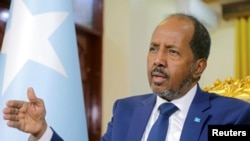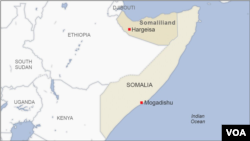Somalia's president has called for a cease-fire after clashes in a disputed town in the breakaway region of Somaliland left at least 13 people dead.
Both sides accuse the other of starting the fighting; Somaliland insisted it was defending itself from aggression.
"The reason for the confrontation is not due to animosity, but for political reasons," Somali President Hassan Sheikh Mohamud said on Tuesday. "Therefore, we are sorry and not happy about what is happening there. ... Respect the interest of the people, lay down arms, and stop the fighting. Start negotiating."
Tensions have been building in Las Anod, the capital of the contested Sool region, since December. The region has been a point of conflict between Somaliland and the semi-autonomous region of Puntland, both of which lay claim to the territory.
"The fighting in Las Anod was ignited by a series of killings in the town and the lack of arrests of the perpetrators," said Mohamed Abdulle, a security analyst and the founder of Daludug Security Services in Somalia. "Somaliland authorities made no arrests to ease the situation. That angered the public."
Somaliland has been governing the Sool region since capturing it from Puntland in 2008. However, the region has witnessed a series of battles between the two sides. Abdulle warns the fighting in the Sool region could impede the ongoing campaign by the federal government in central regions.
"It is possible these clashes could undermine operations against al-Shabab," said Abdulle. "Immediately clashes started, al-Shabab attacked a strategic village and briefly held it. Also, Somaliland uses the term terrorism against the locals fighting its soldiers, so that could increase the insecurity."
Abdiaziz Issack, a security analyst with the cultural and research organization known as the Hamad Bin Khalifa Civilization Center, told VOA that the conflict in the Sool region runs deep and cannot be solved without resolving the Somalia-Somaliland dispute.
"There is no single solution to the conflict in Las Anod and the Sool region at large," he said. "However, it goes back to the dispute between Somalia and Somaliland. The two sides have to agree to a joint administration of the Sool region until the talks between Somalia and Somaliland are concluded."
Clan elders, who had been meeting in Las Anod before the fresh fighting started, said in a communique that they reject the administration of Somaliland over the territory. They said that the region will be governed by the federal government in Mogadishu. Issack said that, while that stance acknowledges the authority of the federal government, President Mohamud will need to take a diplomatic path to avoid a dispute with Somaliland.
Issack said the federal government finds itself in a tight spot regarding the issue.
"While it might want to directly intervene, it guards against going into a collision with Somaliland," said Issack. "Therefore, President Hassan Sheikh Mohamud will just have to continue encouraging dialogue and cease-fire building on the goodwill of his government with the administration in Somaliland."
The fighting in Las Anod has once again ignited the long-running debate over regional autonomy in Somalia. In the past, politicians in the Sool and Sanaag regions have pushed for the formation of a federal member state referred to as Khatumo, but that initiative has not gained recognition from the federal government.
As tensions flare again, the federal government and the break-away region might need to directly engage with one other to avert more killings and to create room for the resumption of long-delayed talks between Somaliland and Somalia.





